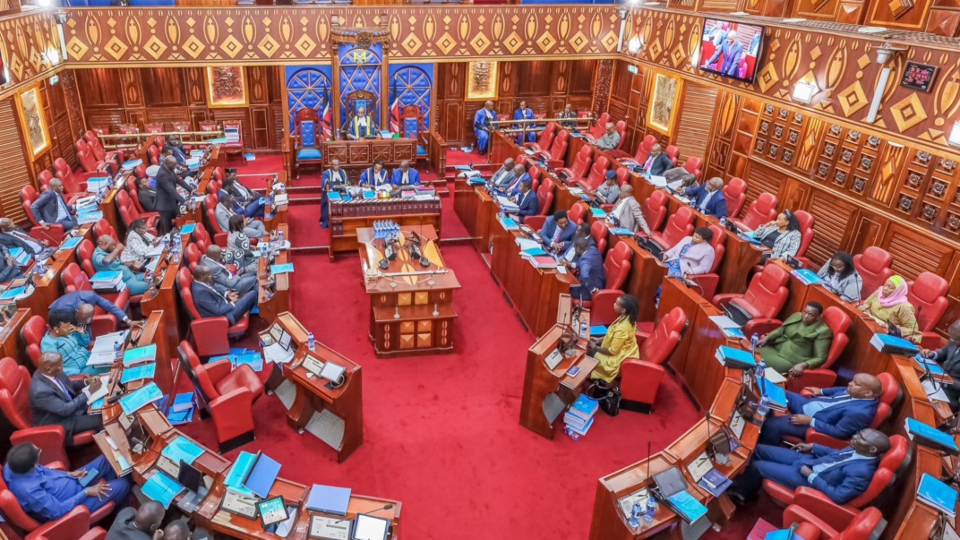Senators Demand President Ruto Substantiates Bribery Allegations Against MPs
In a heated session at Bunge Towers in Nairobi on August 19, 2025, a group of Kenyan senators called for President William Ruto to be summoned to Parliament to provide evidence supporting his claims that lawmakers have been soliciting multimillion-shilling bribes to influence legislative decisions. The Senate’s Public Accounts Committee (PAC), chaired by Homa Bay Senator Moses Kajwang, led the charge, citing Article 125 of the Constitution, which grants Parliament the authority to summon any person to testify before it, akin to the powers of the High Court.
The controversy stems from remarks made by President Ruto during a joint Kenya Kwanza-ODM parliamentary group meeting in Karen, Nairobi, on August 18, 2025. Ruto alleged that he had credible intelligence indicating that members of both the National Assembly and the Senate were engaging in corrupt practices, specifically citing a senator who allegedly received Ksh150 million to sway a parliamentary matter. He further claimed that some MPs pocketed up to Ksh10 million to influence the passage of the Anti-Money Laundering Bill. The president vowed that those involved in such extortion schemes, which he referred to as "soko huru" (a colloquial term for an open market of bribery), would face arrest and prosecution, emphasizing that both bribe givers and receivers would be held accountable.
The senators, including Edwin Sifuna (Nairobi), Jones Mwaruma (vice chair), Enock Wambua, and Samson Cherargei, expressed outrage over Ruto’s statements, arguing that they cast a blanket aspersion on the integrity of elected leaders and risked undermining public confidence in the legislature. Kajwang urged the speakers of both houses, Moses Wetangula (National Assembly) and Amason Kingi (Senate), to summon the president to substantiate his claims with tangible evidence, such as intelligence reports or testimonials. He stressed that the president, as a consumer of raw intelligence and someone with the authority to direct investigations through the Directorate of Criminal Investigations (DCI), should not make unsubstantiated allegations like an ordinary citizen.
Sifuna criticized the parliamentary leadership for failing to defend the institution’s dignity, noting the absence of statements from Senate Majority Leader Stewart Madzayo and Minority Leader Aaron Cheruiyot to counter the president’s accusations. He also accused governors of using the recent Devolution Conference in Homa Bay as a platform to attack senators, further fueling tensions between the Senate and other government entities. Cherargei reinforced the call for accountability, asserting that no one, including the president, is exempt from appearing before Parliament to address such serious allegations.
The senators’ demands come in the context of broader tensions between President Ruto and Parliament, particularly following his accusations of systemic corruption within the legislature. At the 2025 Devolution Conference in Homa Bay on August 13, Ruto had accused MPs of turning parliamentary committees into "money-minting platforms," alleging that they demanded bribes from government officials, including Cabinet secretaries and governors, to produce favorable committee reports or overlook misconduct. He specifically criticized the role of "welfare chairmen" in parliamentary committees, suggesting their primary function was to facilitate extortion.
These allegations have sparked significant backlash, with National Assembly sittings stalling on August 19 as MPs protested by paralyzing committee business, leaving chambers deserted and committee rooms locked. Only the Senate’s committees continued their engagements, though under protest. The unrest reflects growing frustration among lawmakers, who argue that Ruto’s remarks threaten the credibility of Parliament and erode public trust in the institution’s oversight role.
Ruto’s anti-corruption rhetoric has also extended beyond Parliament. During the Devolution Conference, he criticized the judiciary for granting anticipatory bail, which he described as a "Kenyan innovation" that shields corrupt individuals from prosecution. He reiterated his commitment to a robust anti-corruption campaign, announcing the formation of a multi-agency team, chaired by the Executive Office of the President with the Attorney General’s Office as the secretariat, to enhance interagency cooperation in combating graft. The team’s objectives include improving coordination among agencies, engaging state and private sector stakeholders, and raising public awareness about anti-corruption efforts.
However, the senators’ call for Ruto to appear before Parliament has raised questions about whether he will comply. Legal experts note that while Article 125 empowers Parliament to summon any person, the president’s compliance is not guaranteed, as historical precedents suggest heads of state rarely submit to such summons. Additionally, the Ethics and Anti-Corruption Commission (EACC) has stated that it has not received formal complaints about bribery in Parliament but would investigate if credible evidence is presented.
The controversy has also reignited debates about the integrity of parliamentary processes, with some lawmakers and former officials acknowledging that bribery has long been a challenge in Kenya’s legislature. Past allegations, such as those surrounding the Building Bridges Initiative (BBI) Bill in 2021, where MPs were allegedly paid to support constitutional amendments, have fueled perceptions of Parliament as a "house of deals." Critics argue that without concrete evidence and decisive action, such allegations risk becoming political rhetoric that further erodes public trust.
As the standoff continues, the senators’ demand for Ruto to provide evidence marks a critical moment in Kenya’s political landscape, highlighting tensions between the executive and legislative branches and raising questions about accountability, transparency, and the fight against corruption in government institutions.


